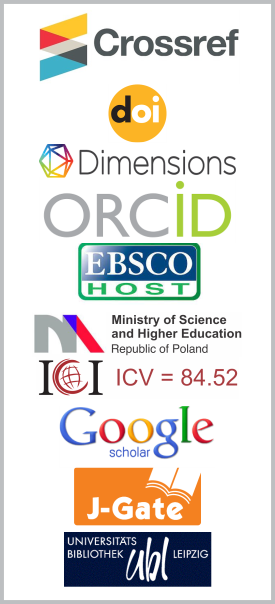Factors Affecting Library and Media Teachers' Performance Improvement: A Pilot Study
DOI:
https://doi.org/10.26713/jims.v9i4.982Keywords:
Performance improvement, Library and media teacher, Skills, Motivation, Knowledge, LMTs perceptionAbstract
This paper reports findings from the pilot study on Factors Affecting Library and Media Teachers (LMTs) Performance Improvement. Thirty-eight respondents involved were from the Teachers' Activities Centre (TAC) of Kapar and TelokGadong Zone, Klang. Selangor. Respondents answered all the 151 questions on the Factors Affecting LMTs Performance Improvement (Skills and Knowledge), with motivation as the moderating factors (Commitment, Self-Efficacy, Reward, Task Complexity, Feedback) and LMTs' Perception on two SRCM Courses (Basic and Intermediate) and also LMTs Performance Improvement. The 151 questions included 7 questions on profiles background. The overall Cronbach Alpha reliability on the items is 0.995, indicating that the measurement reflected high reliability. This study is specifically on research about factors (skills, knowledge, LMTs' perception through Basic (35H) and Intermediate (45H) SRCM Courses), motivation as the moderator factors to improve LMTs' performance. A central aim of this research is to explicate the effect's relationships that exist among factors, and LMTs' performance improvement.Downloads
References
K.M. Awang and N. Othman, The role of library and media teachers in Malaysian School Resource Centre, Journal of Education and Practice 3(2012), 120 – 126.
S.-M. Tan and D. Singh, Preliminary insight of information literacy competencies among school library media teachers, Paper presented at the Fourteenth International Forum on Research in School Librarianship, incorporating the 12th Biennial School Library Association of Queensland Conference, 27 September-1 October 2010, at Brisbane, Queensland, Australia.
F. Zainuddin and I. Kamarulzaman, Measuring Malaysia school resource centers standards through IQ-PSS: an online management information system, in 39th International Association of School Librarianship Annual Conference, Brisbane (2010).
L. Cohen, L. Manion and K. Morrison, Research Method in Education, 6th ed., Routledge, New York (2007).
R.V. Krejcie and D.W. Morgan, Determining sample size for research activities, Educational and Psychological Measurement 30 (1970), 607 – 610.
L. Naing, T. Winn and B.N. Rusli, Sample size calculator for prevalence studies, 2006, available at: http://www.kck.usm.my/ppsg/stats_resources.htm
J. Bethlehem, Applied Survey Methods: A Statistical Perspective, John Wiley and Son, Inc., New Jersey (2009).
J.M. Converse and S. Presser, Survey Questions: Handcrafting the Standardized Questionnaire, Sage Publications, Inc., Iowa City (1986).
L.R. Gay, G.E. Mills and P. Airasian, Educational Research: Competencies for Analysis and Applications, 9th ed., Pearson Education Ltd., London (2009).
P.P. Biemer and L.E. Lyberg, Introduction to Survey Quality, John Wiley & Sons, Inc., New Jersey (2003).
J. Fraenkel, N. Wallen and H. Hyun, How to Design and Evaluate Research in Education, McGraw-Hill Education, New York (2011).
A. Bryman, Social Research Methods, Oxford University Press, New York (2012).
L.W. Neuman, Social Research Methods: Qualitative and Quantitative Approaches, 6th ed., Pearson Education, Inc., Boston, MA (2006).
P.D. Leedy and J.E. Ormrod, Practical Research: Planning and Design, Pearson Education, Inc., New Jersey (2005).
L.W. Neuman, Understanding Research, Pearson Education, Inc., Boston (2009).
N.J. Salkind, Exploring Research, Version 6th ed., Pearson Education International, New Jersey (2006).
P.W. Vogt, Quantitative Research Methods for Professionals, Allyn and Bacon, Boston (2007).
D. Muijs, Doing Quantitative Research in Education with SPSS, Sage Publications Ltd., London (2004).
C.D. Redline, A.D. Dillman and L. Carley-Baxter, Factors that influence reading and comprehension in self-administer questionnaires, Allgemeines Statistisches Archiv 89(1) (2005), 21 – 38
J.F. Hair, W.C. Black, B.J. Babin and R.E. Anderson, Multivariate Data Analysis, 7th ed., Prentice Hall, Upper Saddle River (NJ) (2010).
A. Field, Discovering Statistics using SPSS: (and Sex and Drugs and rock ‘n' roll), 2nd ed., Sage Publications Ltd., London (2005).
R.B. Radhakhrishna, Tips for developing and testing questionnaires/instruments, Journal of Extension 45(1) (2007).
Downloads
Published
How to Cite
Issue
Section
License
Authors who publish with this journal agree to the following terms:- Authors retain copyright and grant the journal right of first publication with the work simultaneously licensed under a CCAL that allows others to share the work with an acknowledgement of the work's authorship and initial publication in this journal.
- Authors are able to enter into separate, additional contractual arrangements for the non-exclusive distribution of the journal's published version of the work (e.g., post it to an institutional repository or publish it in a book), with an acknowledgement of its initial publication in this journal.
- Authors are permitted and encouraged to post their work online (e.g., in institutional repositories or on their website) prior to and during the submission process, as it can lead to productive exchanges, as well as earlier and greater citation of published work.




